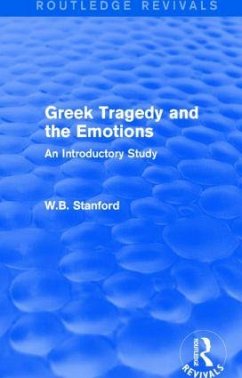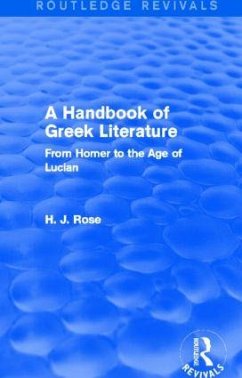
Greek Tragedy and the Emotions (Routledge Revivals)
An Introductory Study
Versandkostenfrei!
Versandfertig in 1-2 Wochen
178,99 €
inkl. MwSt.
Weitere Ausgaben:

PAYBACK Punkte
89 °P sammeln!
According to Aristotle the main purpose of tragedy is the manipulation of emotions, and yet there are relatively few accessible studies of the precise dynamics of emotion in the Athenian theatre. In Greek Tragedy and the Emotions, first published in 1993, W.B. Stanford reviews the evidence for 'emotionalism' - as the great Attic playwrights presented it, as the actors and choruses expressed it, and as their audiences reacted to it. Sociological aspects of the issue are considered, and the whole range of emotions, not just 'pity and fear', is discussed. The aural, visual and stylistic methods o...
According to Aristotle the main purpose of tragedy is the manipulation of emotions, and yet there are relatively few accessible studies of the precise dynamics of emotion in the Athenian theatre. In Greek Tragedy and the Emotions, first published in 1993, W.B. Stanford reviews the evidence for 'emotionalism' - as the great Attic playwrights presented it, as the actors and choruses expressed it, and as their audiences reacted to it. Sociological aspects of the issue are considered, and the whole range of emotions, not just 'pity and fear', is discussed. The aural, visual and stylistic methods of inciting emotion are analysed, and Aeschylus' Oresteia is examined exclusively in terms of the emotions that it exploits. Finally, Stanford's conclusions are contrasted with the accepted theories of tragic 'catharsis'. Greek terms are transliterated and all quotations are in translation, so Greek Tragedy and the Emotions will appeal particularly to those unfamiliar with Classical Greek.













